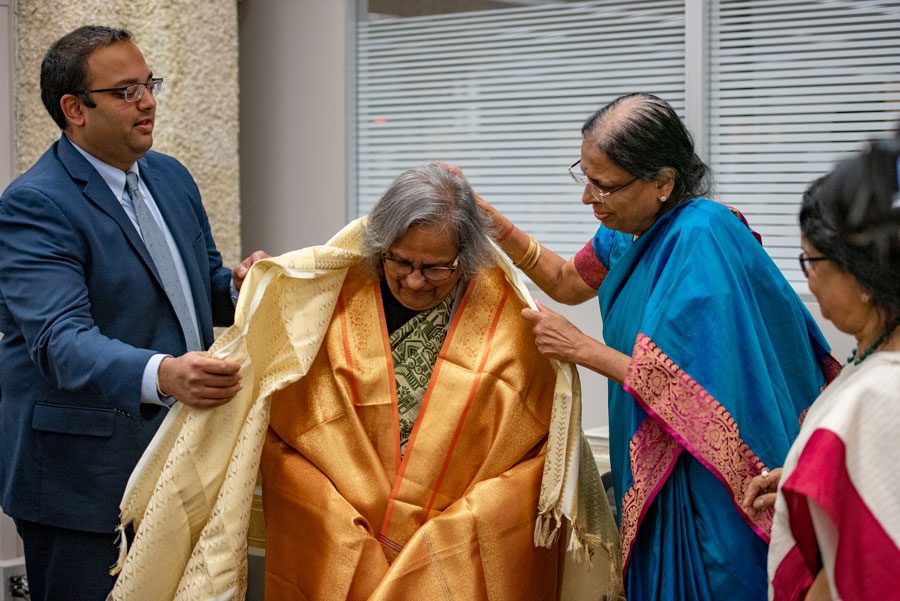Granddaughter of Gandhi discusses importance of nonviolent resistance
Thea Showalter/The Daily Northwestern
Sen. Ram Villivalem (D-Skokie) (left) and Dharani Villivalem (right) honor Ela Gandhi (center) Thursday at Skokie Public Library.
October 18, 2019
SKOKIE — While living with her grandfather in his rural, monastery-like home in India, 7-year-old Ela Gandhi found herself eating boiled pumpkin — a quick, simple meal — twice a day, every day. At the peak of India’s political change in 1947, Mahatma Gandhi still found time daily for hour-long visits with his young granddaughter. When he said his home was called “Sevagram,” because it meant “the place of service,” she said he should change it to “the place of pumpkin.”
He didn’t change his home’s name, but he did write a sermon about how variety is important even in a simple lifestyle, lest a simple life becomes a burden.
And at the height of India’s most turbulent period, the world famous Mahatma Gandhi listened to her.
“I think we learn a lesson from that,” she said. “Listen to the grandchildren, because sometimes they have some important things to tell us.”
Now, 72 years later, Ela Gandhi has a message to those grandchildren: disciplined, courageous, organized nonviolence is now, more than ever, the way to bring about change.
In a discussion hosted Thursday evening by state Sen. Ram Villivalem (D-Skokie) at the Skokie Public Library, Ela Gandhi discussed living with her grandfather’s lasting legacy, the contemporary importance of the nonviolent movement and her life as a nonviolent activist. Earlier this month marked what would have been the activist’s 150th birthday.
“There was a special sense of needing to recognize (Mahatma Gandhi’s) legacy and his work,” Villivalem said.
Prasad Gollanapalli, managing trustee of the Gandhi King Foundation, helped coordinate the event from India. He said he and others are determined to expand Gandhi’s legacy.
“Our concern is how do we take the message of peace and nonviolence around the world, which is more needed now than ever,” Gollanapalli said.
Villivalem also said people should contemplate how Mahatma Gandhi brought people together under one movement. That is especially true now, he said, because “ we have leaders that are trying to divide and conquer” as opposed to bringing people together.
Villivalem added that he thinks nonviolence can accomplish any kind of change.
“The cost of pitting one community versus another or engaging in violent protest is not worth it when it comes to whatever outcome folks are trying to achieve,” he said,”because that outcome will always be scarred by what took place to get there. History shows us that too.”
Ela Gandhi also shared her conviction that violence is not the solution, especially in times of anger or fear. All over the world young people are extremely upset with the way governments are run, she said.
“An important issue is for young people to convert that anger into constructive activity,” she said. “If we say we are unhappy and we want to bring about change, what is the change you want to bring about? They need to be very clear about what kind of change they want.”
While some might say Mahatma Gandhi’s success in India was due to chance, not design, the victories of nonviolent activists Martin Luther King Jr. and Cesar Chavez disprove that, he said.
Nonviolence can bring constructive change, but anger drives people to do things that they regret afterwards, Ela Gandhi said.
“But you must be angry,” she said. “Unless you are angry, unless you are concerned about what is happening…then you are going to allow the status quo to continue.”
Email: theashowalter2023@u.northwestern.edu
Twitter: @theashowalter



